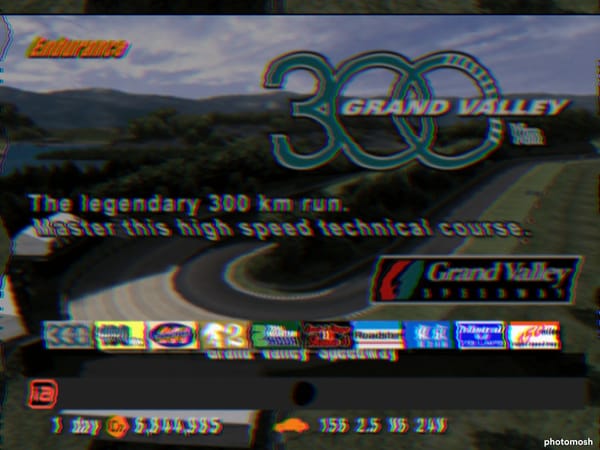The grind. The hustle. The zone. Regardless of what it's called, it's a familiar experience for many of us who immerse ourselves and detach from our surroundings, even if only momentarily.
Of course, it's a sensation not limited to gaming alone, but one that gaming can evoke.
Fundamentally, it’s a result of experiencing something that resonates. Art, essentially. And while I won't get into the age-old debate on what art is, I will say that art is whatever you want it to be.
If you feel it's art, then say no more.
I have the fondest of memories of racing in the Grand Valley 300 in Gran Turismo. I always found studying for exams to be particularly intense and immersing myself in a seemingly never-ending race allowed me to forget about that for a while.
Is that bad?
To some, sure, it sounds like a waste of time. Not leafy enough, not meditative enough. Perhaps people would be less judgemental if I built something wooden with my hands, or painted along with Bob Ross.
Some folks might even go so far as to say it sounds unhealthy, but to me, the grind has always been a way of coping with stress and finding some peace in a chaotic world.
Art is how something extrinsic moves you intrinsically.
Is the grind always an enjoyable experience? No, not always.
"Why on earth would you spend time doing something in a game you're not necessarily enjoying?" is what my dad would ask, and truthfully, it's a tough question to answer.
Before I can answer that question, I have to ask another one… Are games supposed to provide amazing experiences every time? Can they? What if being satisfied is enough? What if I’m not joyful, but just fine, doing each long lap in Gran Turismo, or levelling up my character in my favourite JRPG?
So why do we do it? Why do I grind? In one word: mindfulness.
A good Twitter pal of mine greatly cherishes the solitary experience offered by trucking games, which some people might initially reject due to its similarity to, well, trucking.
But in reality, I suspect he does it because he either enjoys it, or it allows for some degree of decompression after a long day of adult duties.
It's been awhile... pic.twitter.com/gKYvBp3ZvU
— New Millennium Nights (@LateNight2000s) February 2, 2024
Desert Bus. Remember that?
Referred to as the "very worst video game ever created" according to The New Yorker. It's a mini-game, which in turn is part of the cancelled Penn & Teller's Smoke and Mirrors, which had a player drive 360 miles across the desert scrub in Arizona.
As the player advances, the bus gradually veers off-centre on the road, preventing the use of cheat devices to complete the journey.

It's just one long journey where not a whole lot happens. Would people enjoy that type of experience? Possibly. Would most find it boring? Absolutely.
Art is how something extrinsic moves you intrinsically, whether that be boredom or quiet contemplation.
We might never grasp why they ran with this game as part of Penn & Teller's Smoke and Mirrors. It was probably a bit of a joke, to push the boundaries of what's acceptable in gaming, but I like to see it as proof that games can help us relax, just like anything else.
Honestly, games have been providing comparable experiences long before the possible release of Desert Bus. Flight simulators, for instance, offer profoundly solitary experiences where not much occurs between take-off and landing.
"I do it to unwind. It's the perfect response to a stressful day of work. I'm looking for solitude, and this is mine," said a friend of mine after telling me he flew from London to New York.
I probably even baulked at the time, deriding him slightly for doing something so wasteful to his limited time on this Earth.
But Tony, if you're by any chance reading this now, I apologise. I've grown up, and I'm mature enough to know that we all have to deal with some level of shit in our lives, and if flying from London to New York helps you deal with that, then more power to you.
Now, if you'll excuse me, I have another 38 laps to complete at Grand Valley Speedway, after which I'll feel content in the knowledge that I took some time out for myself.












